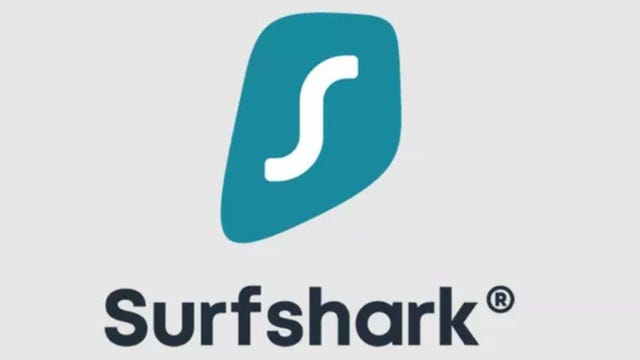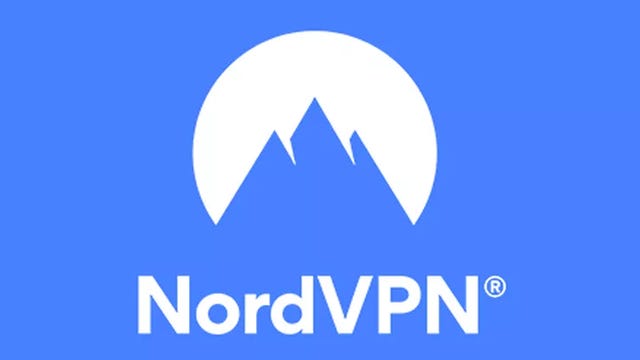Technologies
Best VPN for Amazon Fire TV Stick in 2023
Turn any TV into a smart TV and stream content with privacy using one of the best VPNs for Fire TV Stick.
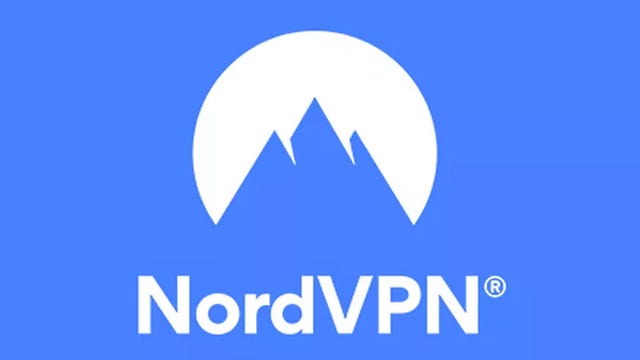
Not every television comes packed with all the top streaming apps, but with a handy device like Amazon’s Fire TV Stick, you can turn almost any TV into a smart TV. Simply by plugging the device in to your TV, you can easily access streaming services like Netflix, Disney Plus, HBO Max, Hulu and Amazon Prime Video, along with live TV, apps and games. There’s a lot you can do with a Fire TV Stick, but to get the most out of the device and maintain your privacy while doing so, you’ll want to pair it with a VPN, short for «virtual private network.»
The Fire TV Stick, as well as TVs that have the Amazon Fire TV system operating system built into them, have a distinct advantage over other streaming products such as Apple TV and Roku. Fire TV is the only major platform to support VPNs built into its online store. You can download and run a VPN alongside most of the streaming services listed above.
After hooking up the device to a television, you can use your VPN to avoid ISP throttling and get around geoblocks while streaming content or gaming (whether you’re at home or traveling abroad), without the need for VPN-compatible routers or complicated home network setups. And with prices as low as $30 for Fire Stick hardware, it remains the easiest way to set up a VPN on your smart TV.
Remember to check local laws and verify that VPN use is permitted by the terms of service with your internet service provider.
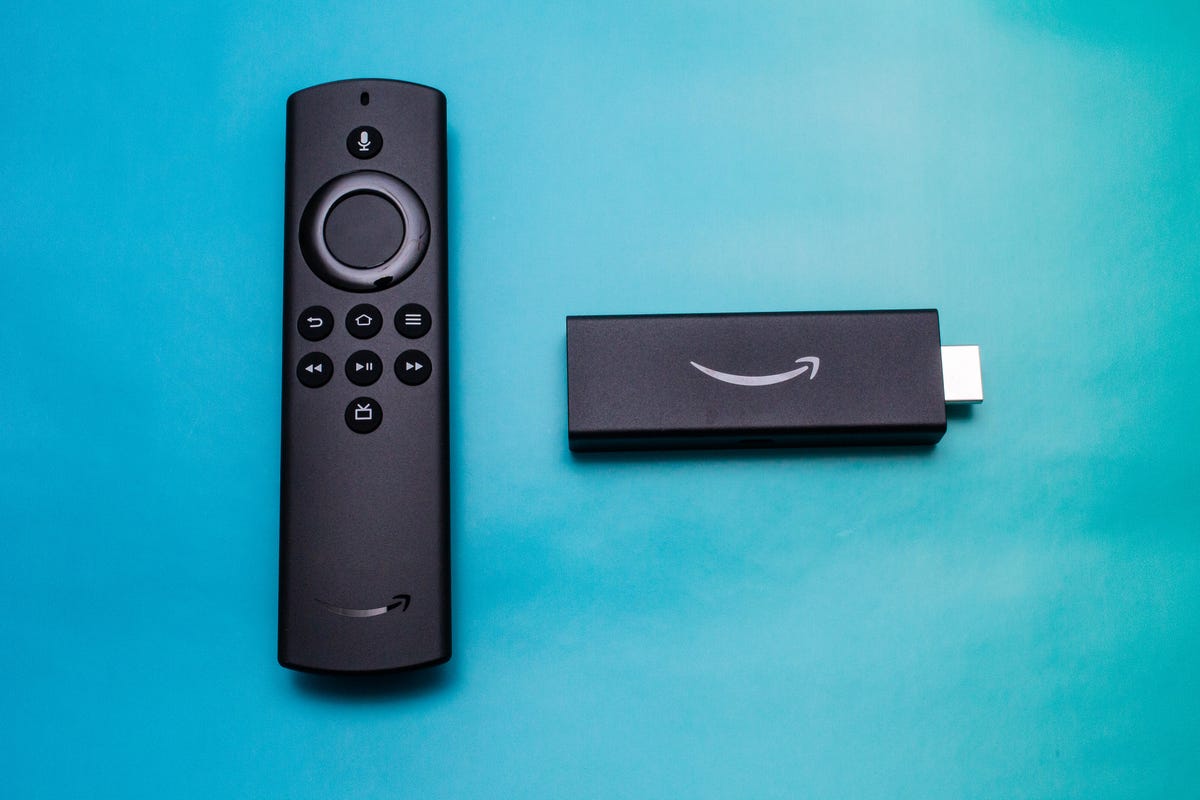
You can use a VPN with your Amazon Fire TV Stick to protect your privacy and get past streaming geoblocking.
How we tested VPNs on Fire TV Stick
Each of CNET’s top VPNs offers a native VPN app for the Fire TV Stick, but a few of them stood out during our tests. In addition to evaluating the usability and features of the Fire TV Stick VPN apps, we prioritized other important factors like security, speed and unblocking capabilities of each VPN we tested.
We opened each app on the Fire TV Stick and first tried to get a sense of the usability and the features available. Is the app easy to navigate and are the servers accessible? Are the features useful, organized and simple to access?
We then evaluated the overall performance of the app to see if the servers connected quickly, whether or not the connections were stable and how well the features performed. Finally, we tested how each VPN was able to provide access to various popular streaming services. Did the streaming services load up and start playing content quickly? Was the streaming experience smooth and absent of buffering? Was the VPN able to provide access to each streaming service we tested, and from multiple server locations? The VPNs that consistently passed these tests earned a spot among our top picks.
Best VPNs for Fire TV Stick
- Latest tests: No leaks detected, 2% speed loss in spring 2022 tests
- Network: 3,000-plus servers in 160 locations across 94 countries
- Jurisdiction: British Virgin Islands
- Price: 5 simultaneous connections for $13 per month, $60 for six months or $100 for a year (current discount: 3 months free). 2-year subscriptions available.
ExpressVPN is CNET’s Editors’ Choice for Best Overall VPN. It’s also the best VPN for Fire TV Stick because it’s super fast and secure, can reliably unblock content and has an excellent app that’s optimized for the Fire TV Stick.
The 2% speed loss we calculated in our spring 2022 tests helped catapult ExpressVPN to the top of our list of the fastest VPNs we’ve tested. Provided you’re getting decent speeds from your ISP, using ExpressVPN can help guarantee a smooth streaming experience whether you’re streaming in HD or 4K.
We didn’t experience any buffering issues during our tests, and all of the streaming channels loaded up and started playing immediately, seemingly unfettered by the VPN. We were able to stream content on Disney Plus, HBO Max, Amazon Prime Video and the US and UK Netflix libraries.
ExpressVPN’s app for Fire TV Stick is packed with features, yet nicely minimalistic and easy to navigate. The app includes features like auto-connect, kill switch, split tunneling and protocol selection, along with a DNS and WebRTC leak testing tool, IP address checker and even a password generator. One additional feature that’s pretty neat and useful is shortcuts, which lets you set shortcuts for five different apps. You can create shortcuts for any app you have on your Fire TV Stick like Neltifx, Hulu or a web browser, and launch the app directly from within the ExpressVPN interface after you’ve connected to the VPN.
The VPN provider has an impressive network of server locations that span 94 countries, meaning you’ll have plenty of options for unblocking content from all over the globe. When connected to ExpressVPN’s servers, your traffic is secured with industry-standard AES 256-bit encryption, which will keep your Fire TV Stick activity private.
ExpressVPN is the best VPN for Fire TV Stick, but it’s also the most expensive. Subscription plans are billed at $100 per year, $60 every six months or $13 a month. A 30-day money-back guarantee is available if you’re not satisfied with your purchase. Read our ExpressVPN review.
- Latest tests: Zero data leaks and 19% internet speed loss in fall 2022 tests
- Network: 3,200-plus in 100 countries
- Jurisdiction: Netherlands
- Price: Unlimited connections for $48 for the first year (then $60 annually) or $13 per month
Surfshark boasts an impressive suite of privacy and security features, unlimited simultaneous connections, easy-to-use interface and expansive global network. And it’s still significantly cheaper than most of its competitors. That’s what helped Surfshark earn CNET’s Editors’ Choice for Best Value VPN in 2022.
Along with standard VPN features such as a kill switch and DNS leak protection, some of the more notable Surfshark features include camouflage mode (which hides the fact you’re using a VPN), split-tunneling, NoBorders mode (which lets you use Surfshark in regions where VPNs are restricted) and multihop VPN connections. You’ll also get access to Surfshark’s CleanWeb technology, which blocks ads and malware and helps you avoid phishing attacks.
One innovation we’re excited to see Surfshark roll out over the next year is its Nexus network, which connects the VPN’s entire network of servers together and allows you to choose multiple servers to route your connection through. The functionality is somewhat similar to Tor, but Surfshark says it’s faster. With its Dynamic MultiHop, IP Randomizer and IP Rotator functions, the Nexus network can give you a few extra layers of protection while you use the VPN — which can be particularly beneficial to users with critical privacy needs.
Surfshark says it doesn’t log any user activity. And although no-logging claims are virtually impossible to prove with 100% certainty, German cybersecurity firm Cure53 declared Surfshark’s security to be «solid» in its 2021 security audit of the VPN. Surfshark says a new audit is forthcoming by the end of this year.
As of February 2022, both Surfshark and NordVPN have the same corporate parent (Tesonet), but Surfshark said it is legally bound not to share any information between the entities that would go against its privacy policy or terms of service. We didn’t find any language in either document that would indicate Surfshark has any obligation to share user data with its parent company or any sibling companies, which include NordVPN.
Surfshark rates consistently as one of the fastest VPNs available, which is why we were surprised that one of the only issues we had with Surfshark came in our speed test. While it still ranks as one of the fastest VPNs we’ve tested — with an internet speed loss of just 19% — we were disappointed with the inconsistent speed results we got to certain locations. Speeds to Europe and Singapore were erratic (dipping as low as 9Mbps to Singapore), while speeds to New York were slower than speeds to the UK and even Australia. Surfshark is in the process of significantly expanding its server network, now offering more than 3,200 servers in 99 countries. The continued expansion of its server network could potentially help bring some more consistency to VPN speeds.
In our tests, Surfshark had no problems unblocking Netflix and Amazon Prime Video content, but we did run into a fair bit of trouble accessing Disney Plus. After testing various servers in the US and other countries where Disney Plus is available, we were finally able to access the content when we connected to a server in Boston. You may need to test a few servers yourself before gaining access to Disney Plus content with Surfshark.
Surfshark offers cheaper introductory prices that jump after the first billing cycle. Even so, Surfshark manages to keep its prices lower than most other VPNs. The yearly plan starts out at $48 for the first year, then jumps to $60 for any additional years of service. If you opt for the two-year plan, you’ll pay $60 upfront for the initial two years combined, then $60 per year for any additional years. Surfshark’s monthly plan stays constant at $13 a month. If you’re not satisfied with the service for any reason, Surfshark offers a 30-day money-back guarantee.
- Latest tests: No leaks detected, 13% speed loss in summer 2022 tests
- Network: 5,600-plus servers in 84 locations across 60 countries
- Jurisdiction: Panama
- Price: 6 simultaneous connections for $12 per month or $67 for a year (current discount: 3 months free). 2-year subscriptions available.
NordVPN’s speeds weren’t quite as fast as ExpressVPN’s, but were faster than Surfshark’s, which helps make this VPN one of the top choices for streaming on a Fire TV Stick.
Streaming was smooth and easy whether we were watching content on Disney Plus, Amazon Prime Video or the US and UK Netflix libraries. NordVPN’s Fire TV Stick app interface is set up differently than the provider’s apps on other platforms, but the pertinent features are mostly accounted for and easy to access.
The app includes features like split-tunneling (which is useful if you don’t want all your Fire TV Stick apps to route through the VPN connection), auto-connect, protocol selection and threat protection lite (a malicious-website blocker). You can also connect to NordVPN’s Onion over VPN and double VPN servers if you want to add an extra layer of privacy to your Fire TV Stick activities. The one thing that’s missing from NordVPN’s Fire TV Stick app is a kill switch — an essential VPN feature that prevents your data from leaking unencrypted by cutting your internet should the VPN connection drop for any reason. The absence of that feature puts NordVPN lower on this list than ExpressVPN and Surfshark, which both offer it.
We noticed that the «Help us improve» setting in the app was enabled by default. If you don’t want to send aggregated anonymous data that could include «crash reports, OS version, marketing performance and feature usage data» over to NordVPN as you use its Fire TV Stick app, then be sure to disable it from the Settings menu.
NordVPN’s network offers more total servers (5,300-plus) than either ExpressVPN or Surfshark, but fewer countries (60), which could potentially limit the breadth of your streaming options. Like our other top picks, NordVPN encrypts VPN traffic using AES 256-bit encryption. NordVPN’s prices are lower overall than ExpressVPN, but more expensive than its sister company, Surfshark. The annual plan is priced at $100 per year (following the $60 introductory rate for the first year) or $12 per month. NordVPN offers a 30-day money-back guarantee on all subscription plans. Read our NordVPN review.
Other VPNs we tested on the Fire TV Stick
We also tested ProtonVPN and IPVanish on the Fire TV Stick. While both providers have native Fire TV Stick apps and are excellent options for various VPN use cases, they didn’t perform to our standards during our Fire TV Stick tests.
Proton VPN’s Fire TV Stick app is very basic and offers no options beyond connecting to a server or reporting an issue. It’s slow to connect and the overall app experience was clunky and awkward. Once we were finally able to connect to a server, we weren’t successful in our attempts to stream content from any streaming service. Oddly enough, it was when we tested Proton VPN’s free version on Fire TV Stick that we were able to access Netflix. Even though Proton VPN’s free tier is one of the only free VPNs that is actually worth using, it’s not optimized for streaming, so it may not always work for accessing geoblocked content.
IPVanish was a little better — the app included various settings and features to tool around with, but we weren’t able to stream UK Netflix or Amazon Prime Video. The automatic app launch feature allowing users to select an app to launch automatically after a successful connection is a nice addition and worked well in our testing when we set it to auto-launch Netflix. But besides that, there wasn’t much more to like about IPVanish’s performance on the Fire TV Stick in terms of features, and it failed to access some streaming services. We decided we couldn’t enthusiastically recommend it as a viable VPN solution for the Fire TV Stick.
We’ll continue to test these and other VPNs on the Fire TV Stick, so be sure to check back often.
Amazon Fire TV Stick VPN FAQs
How do I install a VPN on Amazon’s Fire TV Stick?
Installing a VPN on the Fire TV Stick is easy. You can either navigate to the magnifying glass search icon on your Fire TV home screen and use your remote or Fire TV app on your smartphone to type in the name of the VPN you want to download, or you can use the Alexa function on your Fire TV remote and say the name of the VPN. Then, click on the logo of your selected VPN and click on Get to initiate the download. Click on Open to launch the app and log into your account. Once you’ve logged in, your VPN will ask for your permission to set up a VPN connection. Click on OK to allow the VPN to create the connection. Once you’ve given your VPN permission to connect, you can start using the VPN on your Fire TV Stick.
Can I use a free VPN on the Fire TV Stick?
We don’t recommend using free VPNs on the Fire TV Stick (or in most other situations) because free VPNs typically impose usage and bandwidth restrictions that make them virtually unusable for streaming purposes. They also often sell user information to advertisers and can sometimes even contain malware. If you’re on a budget, we’d recommend choosing Surfshark as your Fire TV Stick VPN as it’s cheaper than a lot of the competition and works well on the streaming device.
Does VPN work on all Fire TV Stick generations?
No, VPNs are not compatible with the first generation of Fire TV Stick. VPNs work on second- and third-generation Fire TV Sticks as well as the Fire TV Stick 4K and 4K Max.
Can I use a VPN on Fire TV Cube?
Yes, Amazon’s Fire TV Cube has the same interface as the Fire TV Stick. You can install and use a VPN on the Fire TV Cube the same way you would on a Fire TV Stick. The Fire TV Cube acts as an Alexa speaker that delivers audio and allows you to use voice commands to control your Fire TV interface without having to press and hold the Alexa button on your remote.
More VPN recommendations
Technologies
A New Bill Aims to Ban Both Adult Content Online and VPN Use. Could It Work?
Michigan representatives just proposed a bill to ban many types of internet content, as well as VPNs that could be used to circumvent it. Here’s what we know.

On Sept. 11, Michigan representatives proposed an internet content ban bill unlike any of the others we’ve seen: This particularly far-reaching legislation would ban not only many types of online content, but also the ability to legally use any VPN.
The bill, called the Anticorruption of Public Morals Act and advanced by six Republican representatives, would ban a wide variety of adult content online, ranging from ASMR and adult manga to AI content and any depiction of transgender people. It also seeks to ban all use of VPNs, foreign or US-produced.
Don’t miss any of our unbiased tech content and lab-based reviews. Add CNET as a preferred Google source.
VPNs (virtual private networks) are suites of software often used as workarounds to avoid similar bans that have passed in states like Texas, Louisiana and Mississippi, as well as the UK. They can be purchased with subscriptions or downloaded, and are built into some browsers and Wi-Fi routers as well.
But Michigan’s bill would charge internet service providers with detecting and blocking VPN use, as well as banning the sale of VPNs in the state. Associated fines would be up to $500,000.
What the ban could mean for VPNs
Unlike some laws banning access to adult content, this Michigan bill is comprehensive. It applies to all residents of Michigan, adults or children, targets an extensive range of content and includes language that could ban not only VPNs but any method of bypassing internet filters or restrictions.
That could spell trouble for VPN owners and other internet users who leverage these tools to improve their privacy, protect their identities online, prevent ISPs from gathering data about them or increase their device safety when browsing on public Wi-Fi.
Read more: CNET Survey: 47% of Americans Use VPNs for Privacy. That Number Could Rise. Here’s Why
Bills like these could have unintended side effects. John Perrino, senior policy and advocacy expert at the nonprofit Internet Society, mentioned to CNET that adult content laws like this could interfere with what kind of music people can stream, the sexual health forums and articles they can access and even important news involving sexual topics that they may want to read. «Additionally, state age verification laws are difficult for smaller services to comply with, hurting competition and an open internet,» John added.
The Anticorruption of Public Morals Act has not passed the Michigan House of Representatives committee nor been voted on by the Michigan Senate, and it’s not clear how much support the bill currently has beyond the six Republican representatives who have proposed it. As we’ve seen with state legislation in the past, sometimes bills like these can serve as templates for other representatives who may want to propose similar laws in their own states.
Could VPNs still get around bans like these?
That’s a complex question that this bill doesn’t really address. When I asked NordVPN how easy it would be track VPN use, privacy advocate Laura Tyrylyte explained, «From a technical standpoint, ISPs can attempt to distinguish VPN traffic using deep packet inspection, or they can block known VPN IP addresses. However, deploying them effectively requires big investments and ongoing maintenance, making large-scale VPN blocking both costly and complex.»
Also, VPNs have ways around deep packet inspection and other methods. CNET senior editor Moe Long mentioned obfuscation like NordWhisper, a counter to DPI that attempts to make VPN traffic look like normal web traffic so it’s harder to detect.
There are also no-log features offered by many VPNs to guarantee they don’t keep a record of your activity, and no-log audits from third parties like Deloitte that, well, try to guarantee the guarantee. There are even server tricks VPNs can use like RAM-only servers that automatically erase data each time they’re rebooted or shut down.
If you’re seriously concerned about your data privacy, you can look for features like these in a VPN and see if they are right for you. Changes like these, even on the state level, are one reason we pay close attention to how specific VPNs work during our testing, and make sure to recommend the right VPNs for the job, from speedy browsing to privacy while traveling.
Correction, Oct. 9: An earlier version of this story incorrectly stated how RAM-only servers work. RAM-only servers run on volatile memory and are wiped of data when they are rebooted or shut down.
Technologies
AWS Outage Explained: Why Half the Internet Went Down While You Were Sleeping
Reddit, Roblox and Ring are just a tiny fraction of the hundreds of sites and services that were impacted when Amazon Web Services went down.
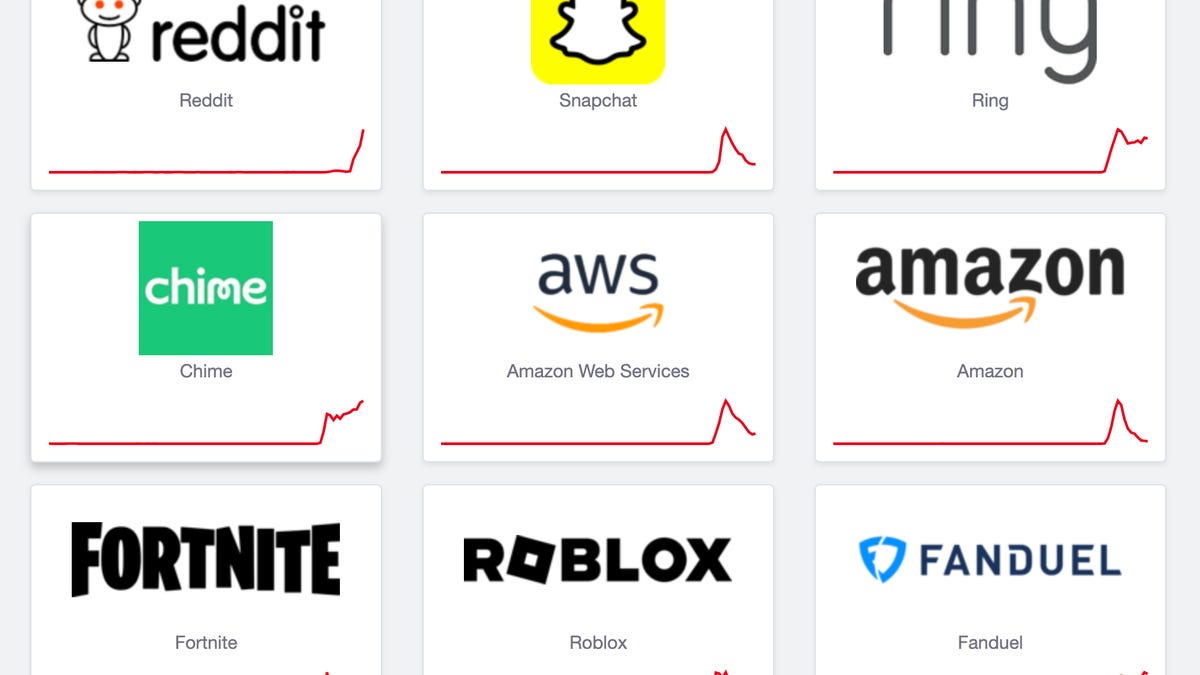
The internet kicked off the week the way that many of us often feel like doing: by refusing to go to work. An outage at Amazon Web Services (AWS) rendered huge portions of the internet unavailable on Monday morning, with sites and services including Snapchat, Fortnite, Venmo, the PlayStation Network and, predictably, Amazon, unavailable for a short period of time.
AWS is a cloud services provider owned by Amazon that props up huge portions of the internet. As with the Fastly and Crowdstrike outages over the past few years, the AWS outage shows just how much of the internet relies on the same infrastructure — and how quickly our access to the sites and services we rely on can be revoked when something goes wrong.
Just after midnight PT on October 20, AWS first registered an issue on its service status page, saying it was «investigating increased error rates and latencies for multiple AWS services in the US-EAST-1 Region.» Around 2 a.m. PT, it said it had identified a potential root cause of the issue, and within half an hour, it had started applying mitigations that were resulting in significant signs of recovery.
«The underlying DNS issue has been fully mitigated, and most AWS Service operations are succeeding normally now,» AWS said at 3.35 a.m. PT. The company didn’t respond to request for further comment beyond pointing us back to the AWS health dashboard.
Around the time that AWS says it first began noticing error rates, Downdetector saw reports begin to spike across many online services, including banks, airlines and phone carriers. As AWS resolved the issue, some of these reports saw a drop off, whereas others have yet to return to normal. (Disclosure: Downdetector is owned by the same parent company as CNET, Ziff Davis.)
Around 4 a.m. PT, Reddit was still down, while services including Verizon and YouTube were still seeing a significant number of reported issues.
Technologies
Verum Messenger: How to Protect Your Personal Data and Why Choosing a Secure Messenger Matters
Verum Messenger: How to Protect Your Personal Data and Why Choosing a Secure Messenger Matters

A major data leak has been reported involving users of the Russian messenger MAX. Hackers claimed to have obtained the platform’s entire database, which includes 46,203,590 records. To prove their claims, they published part of the stolen data publicly.
According to preliminary information, the attackers gained access to users’ personal details, including contact numbers, chats, IP addresses, and other sensitive data. Cybersecurity experts warn that such incidents can lead to serious consequences — from account takeovers and extortion to large-scale phishing attacks.
Why these leaks happen
The main cause of such breaches is the storage of personal user data on servers without adequate protection or encryption. If attackers gain access to these servers, users’ information becomes fully exposed.
Additionally, many popular messaging apps require users to register with a phone number and provide extra personal information, increasing the amount of data that can be stolen.
How to reduce the risks
The only reliable way to protect your personal messages and data is to use messaging platforms that do not store personal information on their servers and rely on true end-to-end encryption.
One such solution is Verum Messenger — a next-generation app built on the principle of maximum privacy. The platform:
- does not store users’ personal data;
- uses unique encryption keys generated locally on the user’s device;
- does not require a phone number or other personal information to register;
- has no access to messages, calls, or files;
- provides effective anti-spam and anti-scam protection;
- offers private chats and group channels with flexible security settings.
Even in the event of a server breach, attackers would not be able to access message content — because encryption keys simply do not exist on the company’s side.
Freedom of communication without the risk of leaks
In addition to its strong security foundation, Verum Messenger offers a built-in ecosystem of tools — from encrypted email Verum Mail and an integrated VPN for anonymous connections to free crypto mining with Verum Coin and eSIM connectivity in over 150 countries worldwide.
As data breaches become increasingly common, choosing a secure messenger is no longer just about convenience — it’s about personal safety.


